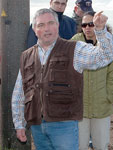Historians Defined
Question

What does it take to be a historian and what do they do on a daily basis?
Answer
There are thousands of historians at work today, but they work in a wide variety of jobs and ways. Fundamentally, to be a historian you need to love digging into the raw materials of history and an enthusiasm for sharing what you find. But how and where someone works as a historian makes for a wide variety of stepping stones to a career.
To do history in a professional way generally requires an advanced degree in history or a closely related field. Historians who work at colleges and universities, for instance, typically need a doctoral degree to get a job.
Historians employed in other workplaces (often called public historians) generally need advanced degrees in history and other types of certification for the jobs they intend to do (museum studies training for a job at the Smithsonian Institution, for instance).
Historians working as researchers (and this includes historians at colleges and universities as well as public historians) tend to do pretty similar types of work. They develop a sense of the standard opinions on a particular historical subject by reading what other historians have already written on the subject, and then they dig into the source materials to build a new interpretation or follow a new insight. These findings are then put together in any of a variety of forms, such as books, articles, websites, reports for clients, or museum scripts.
Historians working in academia tend to divide their time between their roles as researchers and their roles as teachers. As teachers they spend a significant amount of time preparing for classes, working with students, and assessing their students' work.
Historians working in other workplaces tend to divide their time as researchers with other types of activity—working as administrators at historical societies, for instance, or working with members of the general public at historic sites.
With more than 30,000 historians at work today, there are almost as many different opportunities to do history as there are ways of living the life of a historian from day-to-day.
For more information
Curtis, L. Perry. The Historian's Workshop: Original Essays by Sixteen Historians. New York: Knopf, 1970.
Gardner, James B. and Peter S. LaPaglia, eds. Public History: Essays from the Field. Malabar, FL: Krieger, 1999.
Hunt, Lynn. "How Writing Leads to Thinking (And not the other way around)." Perspectives on History (February 2010). http://www.historians.org/perspectives/issues/2010/1002/1002art1.cfm (accessed July 22, 2010). This is the first in a series of articles reflecting on what historians do and why.
Schulz, Constance, Page Putnam Miller, Aaron Marrs, and Kevin Allen. Careers for Students of History. Washington, DC: American Historical Association, 2002.
